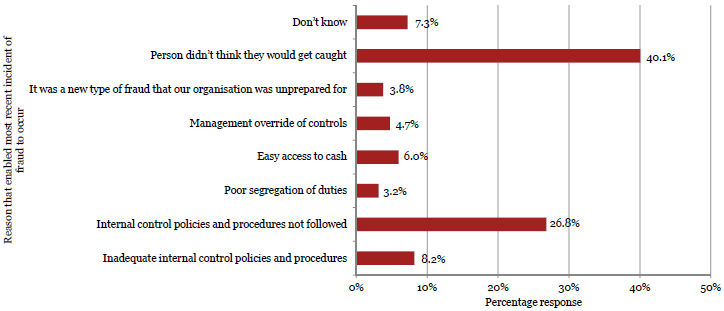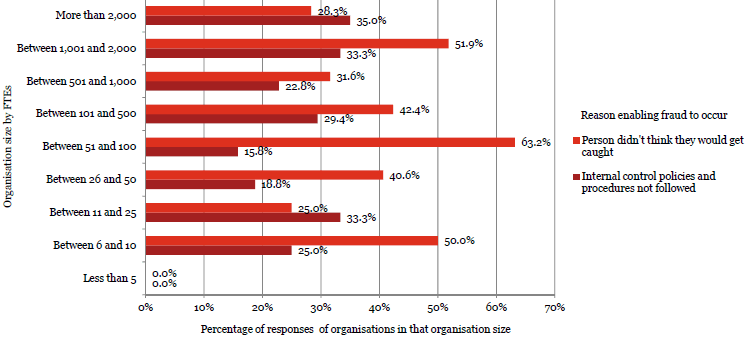39. In the most recent incident of fraud or corruption within your organisation that you are aware of, what was the main reason that enabled it to occur?
Observation:
Of the 22.5% of respondents who were aware of at least one incident of fraud in their organisation, 40.1% indicated that the reason for the fraud was that the perpetrator didn’t think they would be caught. 26.8% indicated it was a result of internal controls not being followed.

Note:
To help simplify the detailed tables, which depict the responses by sector, the main reason that enabled the fraud to occur are in four groups:
1. Inadequate controls or organisation unprepared, encapsulating:
- It was a new type of fraud that our organisation was unprepared for
- Inadequate internal control policies and procedures
2. Internal controls not followed of overridden, encapsulating:
- Management override of controls
- Internal control policies and procedures not followed
3. Poor segregation, easy access to cash
- Easy access to cash
- Poor segregation of duties
4. Person didn’t think they would get caught
Some other examples provided by respondents:
“Employee kept hiding creditor statement and invoice”
“Hadn't considered the possibility of a person on paid leave to continue spending”
“This person used their knowledge of the tax system to fraudulently apply for rebates”
“Use of business Credit Card instead of personal credit card, as personal one left at home - person thought would use and pay back - would not get caught”
“An unofficial tip jar being used to square up cash float unders / overs - small amounts of money.”
| Inadequate controls or organisation unprepared | Internal controls not followed or overridden | Poor segregation, easy access to cash | Person didn’t think they would get caught | Don't know | Total | ||||||
|---|---|---|---|---|---|---|---|---|---|---|---|
| Central Government | |||||||||||
| Autonomous Crown Entities | 1 | 10% | 3 | 30% | 0 | 0% | 5 | 50% | 1 | 10% | 10 |
| Central Government - Other | 1 | 10% | 4 | 40% | 0 | 0% | 4 | 40% | 1 | 10% | 10 |
| Crown Agents or Companies | 1 | 4% | 5 | 22% | 1 | 4% | 16 | 70% | 0 | 0% | 23 |
| Crown Research Institutes | 0 | 0% | 0 | 0% | 0 | 0% | 1 | 50% | 1 | 50% | 2 |
| District Health Boards | 4 | 19% | 7 | 33% | 0 | 0% | 8 | 38% | 2 | 10% | 21 |
| Government Departments | 3 | 5% | 26 | 46% | 2 | 4% | 21 | 38% | 4 | 7% | 56 |
| Independent Crown Entities | 0 | 0% | 0 | 0% | 0 | 0% | 0 | 0% | 0 | 0% | 0 |
| Māori Trust Boards | 0 | 0% | 3 | 100% | 0 | 0% | 0 | 0% | 0 | 0% | 3 |
| Rural Education Activities Programmes | 0 | 0% | 1 | 50% | 1 | 50% | 0 | 0% | 0 | 0% | 2 |
| State-Owned Enterprises | 0 | 0% | 8 | 44% | 2 | 11% | 5 | 28% | 3 | 17% | 18 |
| Tertiary Education Institutions | 8 | 24% | 9 | 27% | 7 | 21% | 8 | 24% | 1 | 3% | 33 |
| Sub-Total | 18 | 10% | 66 | 37% | 13 | 7% | 68 | 38% | 13 | 7% | 178 |
| Inadequate controls or organisation unprepared | Internal controls not followed or overridden | Poor segregation, easy access to cash | Person didn’t think they would get caught | Don't know | Total | ||||||
|---|---|---|---|---|---|---|---|---|---|---|---|
| Local Government | |||||||||||
| Airports | 1 | 20% | 1 | 20% | 0 | 0% | 2 | 40% | 1 | 20% | 5 |
| Council Controlled Organisations or Council Controlled Trading Organisations | 1 | 7% | 3 | 21% | 2 | 14% | 6 | 43% | 2 | 14% | 14 |
| Energy Companies | 1 | 7% | 2 | 14% | 1 | 7% | 10 | 71% | 0 | 0% | 14 |
| Fish and Game Councils | 0 | 0% | 0 | 0% | 0 | 0% | 1 | 100% | 0 | 0% | 1 |
| Licensing and Community Trusts | 0 | 0% | 2 | 33% | 1 | 17% | 3 | 50% | 0 | 0% | 6 |
| Local Authorities | 11 | 17% | 16 | 25% | 11 | 17% | 19 | 30% | 6 | 10% | 63 |
| Local Government - Other | 0 | 0% | 0 | 0% | 0 | 0% | 0 | 0% | 0 | 0% | 0 |
| Port Companies | 0 | 0% | 0 | 0% | 0 | 0% | 0 | 0% | 0 | 0% | 0 |
| Sub-Total | 14 | 14% | 24 | 23% | 15 | 15% | 41 | 40% | 9 | 9% | 103 |
| Schools | 6 | 17% | 10 | 28% | 1 | 3% | 18 | 50% | 1 | 3% | 36 |
| Total | 38 | 12% | 100 | 32% | 29 | 9% | 127 | 40% | 23 | 7% | 317 |
Observation:
A person’s assumption that they would not be caught appears in responses for all sizes of organisations.
 page top
page top
